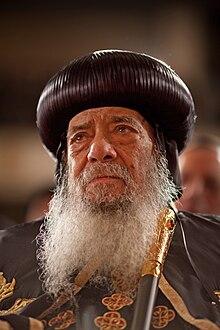
Back شنودة الثالث (بابا الإسكندرية) Arabic ܦܐܦܐ ܫܢܘܕܐ ܬܠܝܬܝܐ ARC شنوده التالت (بابا اسكندريه) ARZ Шэнуда III Александрыйскі Byelorussian Шэнуда III Александрыйскі BE-X-OLD Shenouda III Catalan Šenuda III. Czech Pab Shenouda III Welsh Pave Shenouda 3. af Alexandria Danish Schenuda III. German
His Holiness Pope Shenouda III | |
|---|---|
| Pope of Alexandria and Patriarch of All Africa on the Holy Apostolic Throne of St. Mark the Evangelist of the Coptic Orthodox Church of Alexandria | |
 Pope Shenouda III | |
| Native name |
|
| Church | Coptic Orthodox Church of Alexandria |
| Archdiocese | Alexandria |
| See | Alexandria |
| Papacy began | 14 November 1971 |
| Papacy ended | 17 March 2012 |
| Predecessor | Cyril VI |
| Successor | Tawadros II |
| Orders | |
| Ordination | 1954 (priesthood) |
| Consecration | 30 September 1962 |
| Personal details | |
| Born | Nazir Gayed Roufail نظير جيد روفائيل 3 August 1923 |
| Died | 17 March 2012 (aged 88) Cairo, Egypt |
| Buried | Monastery of Saint Pishoy, Scetes, Egypt |
| Nationality | Egyptian |
| Denomination | Coptic Orthodox Christian |
| Residence | Coptic Orthodox Patriarchal Residence |
Pope Shenouda III (Egyptian Arabic pronunciation: [ʃeˈnuːdæ]; Coptic: Ⲡⲁⲡⲁ Ⲁⲃⲃⲁ Ϣⲉⲛⲟⲩϯ ⲅ̅ Papa Abba Šenoude pimah šoumt; Arabic: بابا الإسكندرية شنودة الثالث Bābā al-Iskandarīyah Shinūdah al-Thālith; 3 August 1923 – 17 March 2012)[1] was the 117th Pope of Alexandria and Patriarch of the See of St. Mark. His papacy lasted 40 years, 4 months, and 4 days, from 14 November 1971 until his death.
His official title was Pope of Alexandria and the Patriarch of All Africa on the Holy Apostolic Throne of Saint Mark the Evangelist, Father of fathers, Shepherd of shepherds, Successor of Saint Mark, thirteenth among the Apostles, Ecumenical Judge, Beloved of Christ. He was also the head of the Holy Synod of the Coptic Orthodox Church. He was known as a conservative figure within the church,[2] and was respected within the Muslim community.[3]
He became a monk in 1954 under the name Father Antonios after joining the Syrian Monastery in Wadi El-Natrun. In 1958, he was elevated to the priesthood. In 1962, Pope Cyril VI summoned Fr. Antonios and consecrated him General Bishop for Christian Education and as Dean of the Coptic Orthodox Theological Seminary, whereupon he assumed the papal name Shenouda, which was the name of the Coptic saint Shenoute the Archimandrite, as well as two previous popes: Shenouda I and Shenouda II.
Following the death of Pope Cyril VI on 9 March 1971, the selection process resulted in Bishop Shenouda becoming the new Pope. He was consecrated on 14 November 1971. During his papacy, the Coptic church grew significantly outside of Egypt. He appointed the first bishops for North American dioceses, which now contain more than 250 parishes, up from four in 1971. He also appointed the first Coptic bishops in Europe, Australia and South America. Within Egypt, he struggled for the welfare of his people and the church. Pope Shenouda III was known for his commitment to ecumenism and advocated inter-denominational Christian dialogue. He devoted his writings, teachings, and actions to propagating understanding, peace, dialogue, and forgiveness.
At the time of his death, Pope Shenouda III was viewed as one of the Great Patriarchs of the ancient Church of Alexandria, a well-known church father and teacher, a chief defender of the faith, and a noted Egyptian leader of the 20th and 21st centuries. He was given the title ‘Teacher of Generations’ for his great talent at relaying complicated theological and other religious concepts in a simple, understandable and deeply spiritual manner.
- ^ "Pope of Egypt's Coptic Christian Church dies". USA Today. 17 March 2012. Archived from the original on 17 March 2012. Retrieved 17 March 2012.
- ^ Zaken, Hillary (18 March 2012). "Egyptian Copts mourn the death of pope". The Times of Israel. Retrieved 18 March 2012.
- ^ Cite error: The named reference
ekkwas invoked but never defined (see the help page).